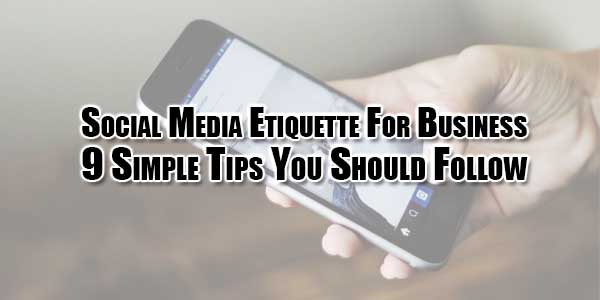
If you’re a keen observer, you might have noticed the influence of social media on one’s reputation. How many celebrities have had their names tarnished for posting some silly tweet? How many companies are on the verge of failing for failing to observe the basic guidelines that guide our habits? Social media etiquette is a vital part of our daily lives nowadays. Learn to use the correct phrases such as ‘thank you’, ‘please’ and so on. You have to understand that the social media world moves way faster and it’s way bigger than your state.
The image you portray out there for yourself is seen by the whole world. Social media etiquette is borrowed from the old offline etiquette that we were all taught by our parents while young. However, while some etiquette is quite general, some are just network-specific. Here is a closer look at some social media etiquette you might want to consider before publishing that content. Remember that when you click the publish button, it’s out there for the whole world and there is absolutely nothing you can do about it.
Table of Contents
1.) Create A Detailed Profile:
Online profiles are sometimes taken for granted, but their significance is something you shouldn’t. You might have a lovely office but never use it as your profile photo. Don’t get all cute with these things. Use your real company name, brand name, and the actual company photo. In as much as it’s pretty basic why you need to use the correct details in your profile, I’m still going to remind you. The world is now full of people with all kinds of an objective. How do I reckon that it’s the real person I’m contacting to deliver my order? How do I tell that it’s not an impersonation of you? Similarly, how do I tell that the information I’m submitting is secure and will be used accordingly? I won’t dare to trust you if I can’t understand clearly that I’m dealing with the right persons.
You need to let me, as the customer, know. A profile clearly outlines your brand, services, services, values, beliefs, your contacts and such crucial information that will get your customers to trust you. No one would dare fill in their personal information if you haven’t done the same. That’s why you need to take the online profile thing seriously.
2.) Separate Business From Personal Life:
Your personal life is yours for the living. That is to say: We DON’T have to know about it. Don’t poop where you eat. Keep it professional by not posting your weekend photos in the company networks. Preferably, try to separate the two as much as you can. Your competitors or the so-called “haters” are always looking for something to hit you and bring you down. Don’t give them any. If it’s a team –building outing, that’s a good photo to post, but, not one of those photos you take while in some vacation in Kuala Lumpar. There might some overlap between your personal life and work of course, but try and keep it balanced. Don’t recommend your drinking buddies on your company website, regardless of these being potential clients/ business partners already.
3.) Be Cautious What To Post, Tag Or Befriend:
It wouldn’t do you any harm to run some background checks on people sending you some friend requests. The ‘don’t judge a book by its cover’ phrase still, applies in social media. Not everyone will send you a friend request with good intentions. Again, your social media image is very crucial. Who you befriend might make or break your name. Since your friends define who you are, it would be advisable if you associated with businesses of character that can actually present your business with some potential clients, visitors or leads.
When it comes to posting different content, ensure you post well-structured content of value. Your audience won’t visit your site again if you post some irrelevant useless content. Avoid offensive posts or those that critique or tarnish your competitor’s name. The same applies to replying or commenting on certain posts. You might also want to stay away from such topics as religion and politics that people have very strict opinions towards. This way you get to avoid getting into unnecessary arguments that might bring about hurt feelings. If you must post a photo, make it professional. It should be high-quality and crisp.
4.) Create Audience Specific Content:
Though this might seem a little obvious or unnecessary for most people, it actually is a good habit to create network/audience specific contents. Your audience would hate it if they realized you’ve been using the same hashtags for the various categories of the audience that you have. I assume you’ve already stratified your customers depending on certain parameters such as age, gender, salary, education and so on. That being the case, it’s a good habit to analyze each stratum and create helpful content for each of these.

5.) Don’t Be Over-Reactive:
Remember what I said about responding to comments? That I must have said, but what I forgot is this: don’t start an online cold-war. What you ought to remember is that most people enjoy arguing on social media. What you don’t know is that businessmen should stay away from unhealthy arguments. These are likely to completely tarnish your company name and your reputation as an individual. This is especially the case when it comes to reputable company heads, popular employees or those of you who directly deal with the end-user. The bottom-line is not to start a war that you can’t fight even if the argument was to garner you some hundred views.
6.) Don’t Befriend People Just To Sell To Them: No One Will Buy:
Have you ever been stopped by a salesman just to sell you an outdated product? It felt devastating, right? I bet it did. It feels the same when you befriend someone, pretend to care about them, then present your product to them after a day or two. Honestly speaking, I wouldn’t buy any of your products, no matter how good they could be. On the contrary, I’d hit the road and that would be the end of our “friendship”.
7.) Well Structured, Grammatically Correct Posts:
I have seen on several occasions some very grammatically incorrect posts on some social media pages for some organizations and even governmental institutions. This is very worrying. It shows the level of ignorance and a poor organizational culture. I’d highly recommend that you use a word document to craft your posts so you use some of these online services used to check the grammar and spellings. Grammarly is just one of the best. Checking for spellings and grammar will just take you less than 2minutes. Imagine the good you can reap from making use of these two minutes and get down to it.
8.) Don’t Post While Emotional/Intoxicated/Overwhelmed:
I don’t know whether you’ve noticed this, but I have. Some people get all creative when under the influence of some emotions or drug. Don’t tweet while angry or all emotional. You’re likely to say some nasty things which like I’ve always said are irreversible. You may delete them, yes, but, the few people who re-tweet, share or comment already have an impression of you.
When Your Friend Requests Are Turned Down, Accept And Move On:
Don’t take it personally if your friend request is turned down. Politely walk away and look for other greener pastures elsewhere. The web is that accommodating. The same principle would apply to you if you got a friend request from some jerk you wouldn’t want to be associated with. Additionally, no matter how desperate you might be for some social media following, NEVER purchase likes, comments posts or product reviews. The effects will later come down to you.
It’s time we took social media etiquette seriously. Whether it’s talking negatively about your competitors, posting content while drunk or over-emotional, posting some erroneous content or any of the above-stated rule activities, don’t get yourself involved.














Be the first to write a comment.